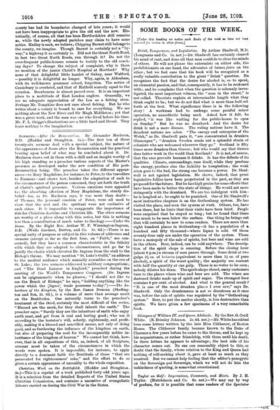SOME BOOKS OF THE WEEK.
[Under this heading we notice such Books of the week as bass not beea . reserved for review in other forms.]
•
Drink, Temperance, and Legislation. By Arthur Shadwell, M.D. (Longmans and Co. 55. net.)—Dr. Shadwell has certainly cleared his mind of cant, and done all that man could do to clear the inindS • of others. He will not please the extremists on either side, the prohibitionists on one hand, the advocates of laissez faire on the other; but we feel sure that his book will be recognised as a really valuable contribution to the great " Drink " question. He recognises the fact that the desire for alcohol is, so to speak, an elemental passion, and that, consequently, it has to be reckoned with; and he complains that when the question is solemnly-inves- tigated, the most important witness, the " man in the street," is not called. Theorists explain at interminable length what they think ought to be ; but we do not find what is more than halLset forth at the best. What significance there is in the following - story ! A workman had to undergo some painful minor operation, no anaesthetic being used. Asked how it felt, he replied, "it was like waiting for the public-house to open on Sunday." But he was no drunkard. And the desire for drink is not a mere disease. The ruling nations have it. The decadent nations are sober. "The energy and enterprise of the Welsh," as Dr. Shadwell puts it, " are concentrated in drunken Glamorgan" ; "drunken Sweden sends out a splendid strain of colonists who are welcomed wherever they go." Scotland is fifty times more drunken than Greece ; but who would say that Greece does better work in the world than Scotland ? It is not, of course, that the race prevails because it drinks. It has the defects of its qualities. Climate, surroundings, race itself, while they produce . the energy, produce also the liability to temptation; the weak' scion goes to the bad, the strong one becomes a power. Dr. Shad- well is not against legislation. He shows, indeed, that great legislative follies have been perpetrated in the past, as they are proposed for the future. But he has high praise for some efforts that have been made to better the state of things. He would act more stringently with the drunkard. We are too indulgent with him : he is laughed at ; he ought to be punished. One of Dr: Shadwell's most instructive chapters is on the Gothenburg system. He has visited the place, and seen the system at work. Others, too, have been there, but he hints that their visits have been brief. People were surprised that he stayed so long ; but he found that there was much to be seen below the surface. One thing he brings out that will certainly be new to some readers. There are more than eight hundred places in Gothenburg—it has a population of a hundred and fifty thousand—where liquor is sold. Of these seventy-four only are under the operation of the system. These have a monopoly of the sale of spirits, but beer and wine are sold in the others. Beer, indeed, can be sold anywhere. The descrip- tion of the spirit shops is amazing. Before the closing hour (about 6 p.m.) a stream of men passes through. Some drink at two gulps 31 oz. of branrin (equivalent to more than oz. of pure alcohol), a spirit of the worst quality; the majority are content with half the quantity at one gulp. There is no water to be seen ; nobody dilutes his dram. The spirit-shops closed, many customers turn to the places where wine and beer are sold. The wines are doctored drinks made up of spirit and sugar. The strongest beer contains 8 per cent of alcohoL And what is the general result ? " It is one of the most drunken places I ever saw," says Dr. Shadwell. Only the drunkenness is not so disastrous as it once was, before the sale of spirits was regulated by the "Gothenburg system." Beer, to put the matter shortly, is less destructive than spirits. We have given a few specimens of a very remarkable book.


















































 Previous page
Previous page